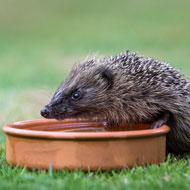Hedgehog sightings mapped by county

"We’re asking anyone who sees a hedgehog to record their sightings on the BIG Hedgehog Map”.
For the first time, Hedgehog Street is mapping the British counties that are recording the most hedgehog sightings.
Conservationists are calling for more people to record their sightings to ensure the BIG Hedgehog Map reflects the most accurate picture.
The map shows all recorded sightings of hedgehogs - dead or alive - since 2015.
According to the map, the top five hedgehog-spotting counties are:
1. Hampshire - 1,250 sightings
2. Oxfordshire - 803 sightings
3. Greater Manchester - 803 sightings
4. Devon - 701 sightings
5. Hertfordshire - 669 sightings
The areas with the fewest recorded sightings include Bath and north-east Somerset, the Isle of Wight and Bristol. Data from Wales, Scotland and Northern Ireland is also very sparse.
Emily Wilson, hedgehog officer for Hedgehog Street, said: “A lower number or no sightings doesn’t necessarily mean there are less hedgehogs in the given area, but simply that we’re not being told about them.
“Therefore, we’re asking anyone who sees a hedgehog to record their sightings on the BIG Hedgehog Map”.
She added: “While the heatmap does not reflect actual hedgehog distribution, the more data we can gather, the better picture we have of where hedgehogs are located across the British Isles, which helps us to protect these beautiful but endangered animals.”
To record sightings or map a hedgehog hole, visit www.bighedgehogmap.org



 RCVS Knowledge has welcomed Professor Peter Cockcroft as editor-in-chief for Veterinary Evidence.
RCVS Knowledge has welcomed Professor Peter Cockcroft as editor-in-chief for Veterinary Evidence.